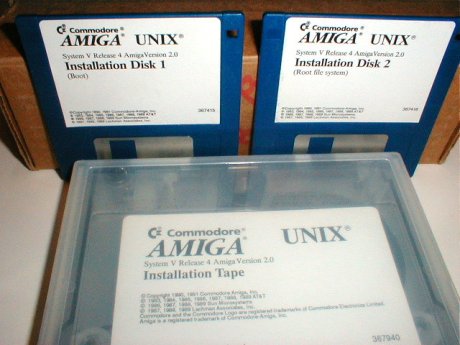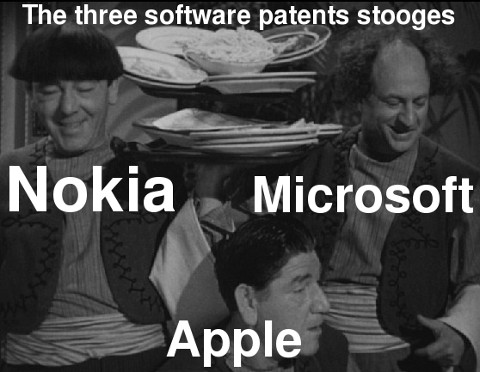01.19.11
Posted in Hardware, Microsoft, Steve Ballmer at 5:52 pm by Dr. Roy Schestowitz
“Steve [Ballmer], I’m sure you’re aware of this. Our call lines are being overrun. [by Vista complaints]“
–Hewlett-Packard Chief Executive Mark Hurd
Summary: Steve Ballmer needs to leave due to failure after failure, say pundits
Apple’s Steve is out and Information Week seemingly thinks that Steve Ballmer is next:
So here we are in the second week of January, and it’s already looking like 2011 could be a repeat of 2010 for Microsoft. A confused, belated, and underwhelming mobile strategy? Check. More top-level defections? Check. Languid stock price? Check.
At some point, it all comes back to Ballmer, the CEO. The question now is how long Microsoft’s institutional shareholders, and its board (which cut Ballmer’s bonus in half last year following the KIN debacle) will let this go on.
“Ballmer’s Microsoft desperately needs a makeover” says the deadline of a very strongly-worded and critical piece from Nick Farrell in the British press:
It seems that all Microsoft’s chickens have come to roost and have now tucked up their heads under their wings and are dreaming of wriggly grubs.
After years of being the bad-guy in many of the IT industry deals, the Imperium is reaching the point where the great unwashed will only buy its operating system, somewhat grudgingly.
For the last few years Microsoft has been entirely on the back foot and yet still regarded with suspicion. Its own attempts to enter the mobile industry have been treated with much mirth, somewhat unfairly. If any other company had produced it everyone would be praising it to the skies, and yet for some reason it is failing to move.
All those years of evil court cases, anti-trust actions, buying rivals out generally being the corporate Mr Evil have undermined its image to the point that people expect it do something nasty.
Lately however the sum total of the Imperium’s legal efforts have been defensive against other companies who are playing the patent wars against it.
Microsoft’s brand is becoming quite worthless. Products like KIN and Vista Phony 7 [sic] quickly become an epic joke, the malice of the company aside. There is this widely-watched cartoon about them generally being disliked and even the raves about Xbox are apparently in vain as Nintendo is the only company which actually makes money from consoles and its lead is said to be maintained:
It appears the Nintendo Wii finished 2010 as the top-selling video game console, with the Xbox 360 nipping on its heals.
Following the release of video game sales figures by market research firm NPD Group, Nintendo announced it had sold more than 7 million Wiis last year, with 2.3 million of those getting scooped up in December alone. The company also sold 8.5 million DS handhelds in 2010, impressive numbers ahead of the spring launch of the Nintendo 3DS.
Take this with a grain of salt because the last time we checked, NPD Group was funded by Nintendo. NPD’s business model relates to deficient statistics which leave room for bias. In any case, the leadership of Xbox left in droves and there is almost nobody left to leave, except Ballmer. My co-host Tim predicts that Ballmer will have no more than 6 months left at Microsoft. There will be no-one left to threaten furniture. █
“I have never, honestly, thrown a chair in my life.”
–Steve Ballmer, Microsoft CEO [CNET News]
Permalink
 Send this to a friend
Send this to a friend
Posted in Antitrust, Apple, Europe at 5:26 pm by Dr. Roy Schestowitz

Summary: Apple’s CEO leaves the company and hardly provides an explanation; immediately afterwards Apple is accused of market abuse
The announcement about Steve Jobs’ departure did not interest us immediately because just about every site covered it and mimicked Wikipedia’s pagefest with a mug of some allegedly heroic figure. Apple put it like this:
At my request, the board of directors has granted me a medical leave of absence so I can focus on my health. I will continue as CEO and be involved in major strategic decisions for the company.
Fab, an Apple sceptic, put it like this:
How long this leave is expected to last is unknown.
People who lurk in this site and are longtime Apple customers tell us that Steve Jobs is a disgusting person and has always been a disgusting person, so his departure from Apple can generally be beneficial to computer users’ rights, even freedom (if Apple knows what this word means at all). People must remember that Jobs — like Gates — is surrounded by PR people. As one news site rightly points out, details are unknown about this departure and the relevance to Microsoft and Linux was explained by Wayne Borean:
Meanwhile Linus Torvalds is working quietly away. Curiously the operating system kernel that he designed as a college project has now passed Apple in market share on phones, desktops, servers, and will pass Apple on tablets within a year. And the GNU project parts that Richard Stallman inspired are used on top of the Linux kernel to make up a complete operating system have also passed Apple for market share.
We particularly liked Ghabuntu’s take on it: “Again, this piqued my curiosity in the sense that here’s a company that has some of the most loyal and vociferous users in the world but yet has it’s entire charm, charisma and ‘lifeline’ vested in one man. The natural question that comes to mind here is, can Apple survive the demise of Jobs someday?
“There’s also an interesting contrast here between Apple and arch rival Google in that the persona and charm of the latter is almost entirely represented by those six alphabets, completely omitting founders Larry Page and Sergey Brin.”
Well, we have a little theory about Jobs’ departure. He could probably put that off for a bit, but let us talk about timing and note that Europe has opened a probe into Apple’s practices:
Belgium said Monday it would probe Apple’s policy of requiring newspapers and magazines to go through the iTunes store to sell subscriptions for the iPad tablet.
Economy Minister Vincent Van Quickenborne asked the country’s competition watchdog to review whether Apple abused its dominant position after several Belgian and Dutch editors were notified about the US company’s policy.
A recent document from Apple “indicates that from now on, iPad subscriptions will only be sold via iTunes,” the minister’s office said in a statement.
Vincent Van Quickenborne also lobbied for ludicrous laws that help Microsoft, sometimes while citing Microsoft lobbyists from ACT [1, 2, 3, 4, 5, 6, 7, 8, 9, 10, 11, 12]. This man cannot be trusted and Free software proponents in Belgium do not like him because his policies help Microsoft a lot of the time.
Speaking of hypePads, they lead to lawsuits: “The U.S. Department of Justice (DOJ) will file criminal charges against the alleged attackers who copied personal information from the AT&T network of approximately 120,000 iPad users, the U.S. Attorney’s Office, District of New Jersey announced Monday.”
Jobs chose a good time to step down. █
Permalink
 Send this to a friend
Send this to a friend
Posted in Microsoft, OIN, Patents, UNIX at 4:46 pm by Dr. Roy Schestowitz

Summary: OIN cannot and would not sue, unlike Microsoft and its shells/pools; CPTN and AttachMSFT [sic] would be bad guardians for Novell’s virtual assets
THERE IS a new FUD/spin pattern and some news regarding CPTN [1, 2, 3, 4]. Owing to messages from Microsoft mobbyists, we realise that they currently try to spin OIN as an illegal thing. Now that Nexenta Systems joins the OIN [1, 2] which continues this amazing pace of over one joiner per week, it sure seems like there is stronger defence for Linux. And yes, OIN is defensive and unlike companies which claim their portfolios to be defensive, OIN has no shareholders and it cannot be sold. The latest announcement says:
Open Invention Network (OIN), the company formed to enable and protect Linux, today extended its community with the signing of Nexenta as a licensee. By becoming a licensee, Nexenta has joined the growing list of organizations that recognize the importance of leveraging the Open Invention Network to further spur open source innovation.
The mobbyists are trying to compare OIN to CPTN, which is of course laughable. The OSI has complained about CPTN and so has the FSFE in Europe (this one is the official statement). Meanwhile, at least two Microsoft/SCO boosters — Maureen O’Gara and Microsoft Florian — rave about the Microsoft patent cartel (CPTN) not being stopped by the European Commission. It should be added that trying to point a finger at OIN as total spin possibly means that they have something to conceal. It’s effective means of diversion.
IDG has just published this new report from CPTN, from which Groklaw quotes:
Additional details have emerged regarding the more than 800 patents Novell is selling to the Microsoft-led consortium CPTN Holdings for US$450 million, about two months after the deal was first announced.
[...]
While preparing to close the deal, Novell discovered that “19 of the patents to be sold to CPTN pursuant to the Patent Purchase Agreement are lapsed Australian, German or Austrian patent applications rather than issued Australian, German or Austrian patents.” Novell also found that one of the issued patents was referenced twice, it adds.
“As a result, if the patent sale occurs, CPTN would purchase 861 issued patents and pending patent applications and 20 lapsed patent applications,” the filing states.
CPTN has proposed that it be given additional issued patents and pending patent applications in Novell’s portfolio, in order to “unite certain patent families,” “compensate CPTN for the reduction in issued patents,” as well as other considerations. “Attachmate has informed us that they currently do not intend to consent to our changing the list of assigned patents under the Patent Purchase Agreement,” Novell said.
“Is this some kind of hustle,” Groklaw asks, “A Microsoft-organized consortium asks for Unix patents, which is what we heard Attachmate would get, and the answer is Attachmate won’t consent “currently”? Uh oh.” Groklaw later did a whole article about it, repeating some of the above:
The 882 patents turn out not to be 882 after all. There are only 861, and the Microsoft consortium would like some of Attachmate’s to make up for the few they’ve discovered don’t exist… Wait. What? Attachmate was to get only patents and copyrights associated with Novell’s UNIX and Linux businesses, right? Microsoft wants some of those? Like, um… some UNIX copyrights perchance? Novell says Attachmate won’t “currently” consent.
What about later? Is this some kind of hustle?
Yes, this is what we said about UNIX at AttachMSFT a long time ago, way back in November. █
Permalink
 Send this to a friend
Send this to a friend
Posted in Intellectual Monopoly, Patents at 4:22 pm by Dr. Roy Schestowitz

Summary: Patent wars and bureaucracy slow down production, create financial bubbles, and can ultimately lead to increase in debt
THERE is this famous type of joke which ends with “then the terrorists win!” That’s basically the idea behind the title above (not that the Chinese are terrorists, I personally admire the Chinese). The worst that the West can do is neglect production and falsely assume that paper-pushers in an age of so-called ‘knowledge workers’ will help repay the huge debt to China. The matter of fact is, China already immunises itself against Western patents and while the West wastes time and energy on litigation, patent applications, patent reviews, and crippling of products as means of avoiding being sued, China’s export is thriving.
Wayne Borean echoes analyses we have seen a lot of in late 2008 when the world markets collapsed. He says that “Intellectual Property” is a bubble that artificially inflates valuation of many worthless things. And moreover, to quote:
Intellectual Ventures is one of many companies that is investing in Innovation according their their press releases. Another is Acacia Technologies. These companies are buying up patents, and attempting to license them.
As if the patent ‘business’ was not bad enough already, the lawyers in IAM say that in Britain there’s this notion of “patent tax incentive” in the pipeline. Ridiculous! We mentioned this before.
The Institute of Fiscal Studies – a highly-respected, independent research organisation that scrutinises fiscal and economic policy in the UK – has published a paper that questions the effectiveness of introducing a so-called patent box. Under the proposals, which were first announced by the previous government, and have now been rubber-stamped by the current one, income derived from patents in the UK would be subject to a Corporation Tax rate of just 10%.
In order to compete in this century (even decade) and as means of maintaining or regaining dominance, the West will need to remove the ‘innovation tax’ — the hidden cost associated with patents and the meta-industry which hovers above it like a group of vultures or satellites optimised for guided missiles. Make products, not (patent) war. █
Permalink
 Send this to a friend
Send this to a friend
Posted in Apple, Microsoft, Patents at 3:55 pm by Dr. Roy Schestowitz

Summary: The codecs debate is disrupted by lies and misdirection from known boosters of Microsoft, who found a ‘host’ in Ars Technica
SITES like Ars Technica were exceptionally informative before Microsoft minions came long and took positions as authors. In the case of Ars Technica (other sites like The Register have had similar problems), Peter and Emil are the principal Microsoft boosters and they make the site reek sometimes.
Some days ago we wrote about Peter's latest gross spin, which was picked by many sites not because it was accurate but because it needed rebuttal. The mobbyists and the boosters — people just like Peters — are using the same spin and lies to defame those who advance open standards, ridicule companies that work against this goal, and confuse a lot of people who do not understand technology well enough. Groklaw too has responded to Peter’s spin, specifically writing: “ars technica shows its true colors in this article, which demonstrates it doesn’t at all grasp the value of freedom, so it doesn’t get why patents are contrary to achieving it. One subhead in the article says it all, “Is freedom all it’s cracked up to be?” The answer to that question can only be, from Google and me, is “Yes, it is.” Google has taken a bold step, and it deserves commendation, not snarky articles like this. Go Google.”
We linked to other rebuttals the other day. There are many that include Steven J. Vaughan-Nichols’ or Adam’s (from Fedora, linked yesterday) and they are damaging to the once-good reputation of Ars Technica. Maybe it goes through the same phase that The Register went through some years ago (writers still leave the publication at a high pace, which only makes it more susceptible to entryism). Anyway, let us digress. Someone from Opera also responded to this booster from Ars Technica and reached the point where he could show Peter’s spin for the nonsense that it is.
Conclusion: By rejecting that which closes the web, while at the same time promoting open technologies, Google is contributing to a more open web, contrary to the claims in the article.
The same person from Opera provided some numbers that compare WebM and H.264:
Conclusion: The Numbers
As you can see, WebM has a huge advantage when it comes to browser adoption.
IE users are notoriously slow at upgrading, and IE9 will only be available for Windows Vista and Windows 7. Half of all Windows users will not be able to upgrade to IE9!
On the other hand, recent versions of Opera and Chrome already support WebM, users are upgrading to these versions much faster than they are upgrading Safari or IE, and Firefox 4 is likely to be released in the near future, thereby boosting the market share of WebM-supporting browsers to possibly more than 30-40%.
This leaves Safari basically carrying the torch for H.264 with little help from Internet Explorer. Within the next 12-24 months, H.264 might be lucky to have a market share above 10%!
As a final nail in the coffin, IE9 and Safari, being bundled with operating systems, are likely integrated with those operating systems in a way which makes adding WebM support as simple as installing it as a system codec.
In reference to those who give Microsoft the benefit of the doubt when it comes to web standards, Groklaw wrote: “I don’t think it’s that Microsoft can’t grok the web. It’s that it doesn’t like it. In Apple’s case, I see the app store as Apple’s way to get a kind of open source substitute — a way to get programmers to enhance the value of its hardware without Apple having to do all the programming itself. One has to admit Apple’s a bit more fair than some companies that use FOSS without sharing a dime with the programmers or even a share in the trademarks the programmers help to build. But it’s still a substitute for the real thing. Google has the real thing. Anyone can build on Android, so it doesn’t need to create an app store to enable programmers to write for Android unless it wants to, because they can already.” And since Apple was already brought up, worth mentioning is Groklaw’s response to Microsoft’s trademark complaints against Apple. “Microsoft has no shame,” Groklaw wrote, “Windows is not a generic name? And didn’t Microsoft block Lindows from using even a sounds-like-Windows name because of a claimed trademark? I mean, come on. Here’s the Microsoft filing, if you are in the mood for a good laugh or a curled lip, depending on your mood today.” █
Permalink
 Send this to a friend
Send this to a friend
Posted in Patents at 3:17 pm by Dr. Roy Schestowitz
Summary: Interesting admissions and revelations from an apparent lobby group which deals with patents
H
OW LOVELY it is when the patent boosters themselves are admitting the obvious, refuting some of their peers’ tired propaganda in the process. PatentFairness.org has this new page about myths and Groklaw quotes from it the following:
Patent reform will drive jobs overseas.
The patent system today discourages U.S. job growth. Productive companies are spending billions of dollars in money and resources to defend themselves against patent lawsuits. The cost of defending an average patent lawsuit is between $2 million and $4.5 million. Furthermore, prior to 1990 there had been only one patent damages award in history larger than $100 million, yet in the past five years, there have been at least ten judgments and settlements in that category, and at least four that topped $500 million. One topped $1.5 billion. This is money that could be otherwise re-invested in the companies, spurring innovation and creating high-paying jobs.
Groklaw has also found this congressional testimony from Chuck Fish, who says:
One popular strategy abusive patent enforcement companies employ is to demand substantial sums of money from an entire industry based on shared procedures mandated by regulations or technical standards. For example, Data Treasury has aggressively asserted its patents against the banking industry – claiming that its patents cover technology for various stages of the check archiving process, including image capturing, centralized processing and electronic storage of document and check information. Several financial institutions have entered into very large settlements instead of running the risk with litigation.
Other plaintiffs that pursue this route often assert that their patents cover a technical interoperability standard. Typically, the purported infringement claims are not raised in the standard-setting process and instead are asserted only after the standard has been adopted. By the time the purported infringement is discovered, it may be prohibitively expensive to adopt and implement a new standard to avoid the patent.
The economic impact of abusive patent cases is by no means limited to lawsuits that are filed, which are only the tip of the iceberg. For example, it is routine for these patent enforcement companies to send demand letters simultaneously to many companies. Indeed, one plaintiff reportedly sent such letters to 75,000 companies. The theory seems to be that at least some recipients will agree to pay license fees to avoid the costs and uncertainties of the current patent litigation system – especially after seeing how companies in similar situations have fared – and their contributions will fund actions against those who have refused to pay tribute.
To quote Groklaw‘s remarks on it (because they are relevant and valuable to us): “The former is one of the things Apple is accusing Nokia of doing, “promotion of standards to the relevant standards-setting organizations while concealing its own patent applications allegedly covering these standards”. The latter is essentially the strategy that Microsoft seems to follow, avoiding litigation which would put their patents at risk of being found invalid, but instead trying to get companies to sign up to avoid litigation. As Fish points out, that doesn’t at all mean that such a strategy excludes litigation eventually against those who don’t sign up.” In the next post we are going to cover the codecs debate, which to Nokia, Microsoft and Apple matters a lot because of penetration of patent monopolies. To them, patent thickets are an advantage point. █

Permalink
 Send this to a friend
Send this to a friend
Posted in Site News at 3:06 pm by Dr. Roy Schestowitz

Summary: Techrights may have no spokespeople, but the word of few core members can qualify as this site’s stance
IT IS truly unfortunate that in order to smear this Web site (for its message), some people will truly scrape the bottom of the barrel and resort to misattribution or misrepresentation. To prevent people from assuming that some certain impolite people speak on this site’s behalf, one reader suggested that we provide a list of accounts whose messages we can be held liable for (in addition to blog posts, but not the wiki and IRC channels which are written by a lot of people). These accounts are:
Techrights: Techrights in Identi.ca | Techrights group in Identi.ca
Boycott Novell: Boycott Novell in Identi.ca | Boycott Novell in Twitter
TechBytes: TechBytes in Identi.ca | TechBytes group in Identi.ca.
Authors: Schestowitz in Identi.ca | Schestowitz in Twitter
If accounts other than the above are found, then they are probably fake and we would appreciate having them reported to us. If somebody claims to represent the site, then too the claim should be taken with a barrel of salt and assumed to be disowned by this Web site. █
Permalink
 Send this to a friend
Send this to a friend
Posted in GNU/Linux, Microsoft, Novell, OpenSUSE at 2:50 pm by Dr. Roy Schestowitz

Summary: The Microsoft-financed Novell to continue having power over the community which drives OpenSUSE development
Susan Linton has done some fantastic job tracking a project she cares so much about — a project we view as troubled amid Novell's sale. Pascal's OpenSUSE problems do not make it look any better and Linton has this latest report:
After the controversy of the openSUSE artist and Board nominee being expelled from the project, packager Nelson Marques asked a series of probing questions to help determine for whom he might vote. The only trouble is he turned to the likes of Nietzsche, Stallman, and Gandhi for inspiration. Now that may not seem like a bad thing at first, but fellow lizards had a problem with it.
In light of the Tom Jowitt interview/chat with Jos Poortvliet [1, 2] (mentioned here 3 days ago), Groklaw quotes: ““The finances for the foundation will depend on the foundation,” said Poortvliet. “Novell will obviously be one of the sponsors, but is is hard to go into specifics.””
“Who else will be funding this adventure? Is Microsoft funding it too?”
–GroklawGroklaw also quotes: ““From the community side however the board has made clear their opinion that they want to move on with this, and it has already set up the bylaws,” said Poortvliet.”
Now, as a quick reminder, Groklaw looked very carefully at the whole “foundation” situation. It did this with a lot of legal folks who lurk and participate in the Web site. Groklaw‘s reaction to the above is as follows: “Uh oh. Who else will be funding this adventure? Is Microsoft funding it too? Or what? Who? When do we get to know? And the board has no choice??? He claims that the bylaws have already been drawn up “by the board”? Compare the notes from the board meeting where the decision was made, after being suggested by Novell’s representative on the board, that Novell’s lawyers would draw up the bylaws. My worries grow after reading this article claiming all is well.”
In the mean time, OpenSUSE keeps talking about the mundane [1, 2] and the exception happens to come from a GNOME developer/contributor from Novell:
Back in October, at the openSUSE Conference, many people were interested in the whole app store/market place/software center topic for openSUSE: we had a session about that, and several hallway discussion. There is no big surprise here, since it’s a hot topic for various OS distributors, and not just our free distributions. Of course, being lazy people, we discussed what we could re-use to minimize our work; the software center used in Ubuntu and the app-install work that Richard did a while ago came to our minds.
OpenSUSE has been contributing to GNOME and KDE (although to the GNOME part Novell contributed Mono), so whatever happens to this project will matter a lot. █
Permalink
 Send this to a friend
Send this to a friend
« Previous entries Next Page » Next Page »
























 Content is available under CC-BY-SA
Content is available under CC-BY-SA